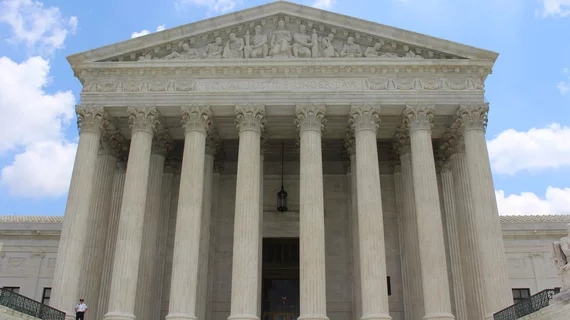How the Supreme Court's environmental ruling impacts healthcare
The Supreme Court has issued another landmark ruling, rolling back authorization of the Environmental Protection Agency’s (EPA) ability to regulate greenhouse gas––and the healthcare industry isn’t happy about it.
Greenhouse gas contributes to climate change, which poses significant public health harms. The Supreme Court ruled 6-3 that the EPA does not have broad authority to shift the nation’s energy production from coal power plants to other, greener sources of energy.
“The American Medical Association (AMA) is deeply disappointed with today’s U.S. Supreme Court opinion restricting the ability of the Environmental Protection Agency (EPA) to regulate the carbon emissions that cause climate change and harm public health,” AMA President Jack Resneck Jr., MD, said in a statement June 30. “Regulating and reducing greenhouse gas emissions is critical for combating the climate crisis and its major health implications, impacting the respiratory, cardiovascular, and immune systems of the U.S. population, with minoritized populations disproportionately impacted.”
The AMA has declared climate change a public health crisis that threatens the health and well-being of all people. The association also supports policies that reduce U.S. greenhouse gas emissions aimed at carbon neutrality by 2050. The AMA also stated it will continue to do its part to protect public health despite the ruling.
The court sided that the EPA cannot adopt regulatory caps on greenhouse gas emissions on its own without approval from Congress.
"Capping carbon dioxide emissions at a level that will force a nationwide transition away from the use of coal to generate electricity may be a sensible 'solution to the crisis of the day.' But it is not plausible that Congress gave EPA the authority to adopt on its own such a regulatory scheme," Chief Justice John Roberts wrote in the majority opinion.
However, Justice Elena Kagan wrote in her dissent that the majority opinion strips the EPA of the power Congress already gave the agency.
“Today, the Court strips the EPA of the power Congress gave it to respond to ‘the most pressing environmental challenge of our time,’” Kagan wrote. Justices Breyer and Sotomayor joined her in dissenting.
Health industry makes climate pledge
The same day the Supreme Court made its ruling, 61 of the largest U.S. hospital and health sector companies signed onto the Biden administration’s Health Sector Climate Pledge, which commits to cutting greenhouse gas emissions 50% by 2030.
“The new commitments represent over 650 hospitals and thousands of other providers across the country, and include plans to strengthen resilience to climate change, protect public health, and lower costs,” the White House announced. “The healthcare sector accounts for 8.5% of U.S. emissions, so these bold commitments advance President Biden’s goal to reduce nationwide greenhouse gas emissions 50-52% in 2030 and reach net-zero emissions in 2050.”
Among the health sector signatories was Ascension and Commonspirit Health, two of the five largest U.S. private hospitals and health systems, as well as NYC Hospitals + Health, the largest public health system in the U.S. The National Academy of Medicine, Association of American Medical Colleges, the Joint Commission and other healthcare industries also joined the pledge.
In addition, the administration announced a series of new resources to support the health sector in transitioning to clean energy, reducing emissions, and building climate resilience, including:
- Federal Health Sector Emissions Reduction Resources
- Federal Health Network on Decarbonization Best Practices
- National Research Forum on Climate Impacts and Heart Health
- Health Sector Emissions Assessment Toolkit
- Federal Funding for Climate Smart Health Facilities
According to the White House, private healthcare companies are also making gains in climate change policies on their own, beyond the Health Sector Climate Pledge. Here are some of the White House’s top examples:
- Providence Health, Advocate Aurora Health and Children’s National Hospital have committed to reduce emissions from medical anesthetic gases used in surgical procedures by over 75%
- AstraZeneca and Chiesi Group are tackling emissions from fluorinated gases used in common devices like inhalers, with the goal of reducing their carbon footprint by at least 90%
- Blue Shield of California, NYC Health + Hospitals, AmerisourceBergen, Kaiser Permanente, Children’s National Hospital and others have constructed on-site solar arrays and other clean energy generation sources
- Seattle Children’s Hospital, Philips, Kaiser Permanente and Blue Shield California have all surpassed their pledge commitment and already achieved carbon neutrality
These efforts and more will help the health sector achieve even greater progress on climate resilience.

